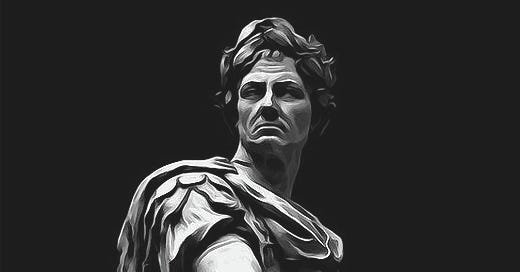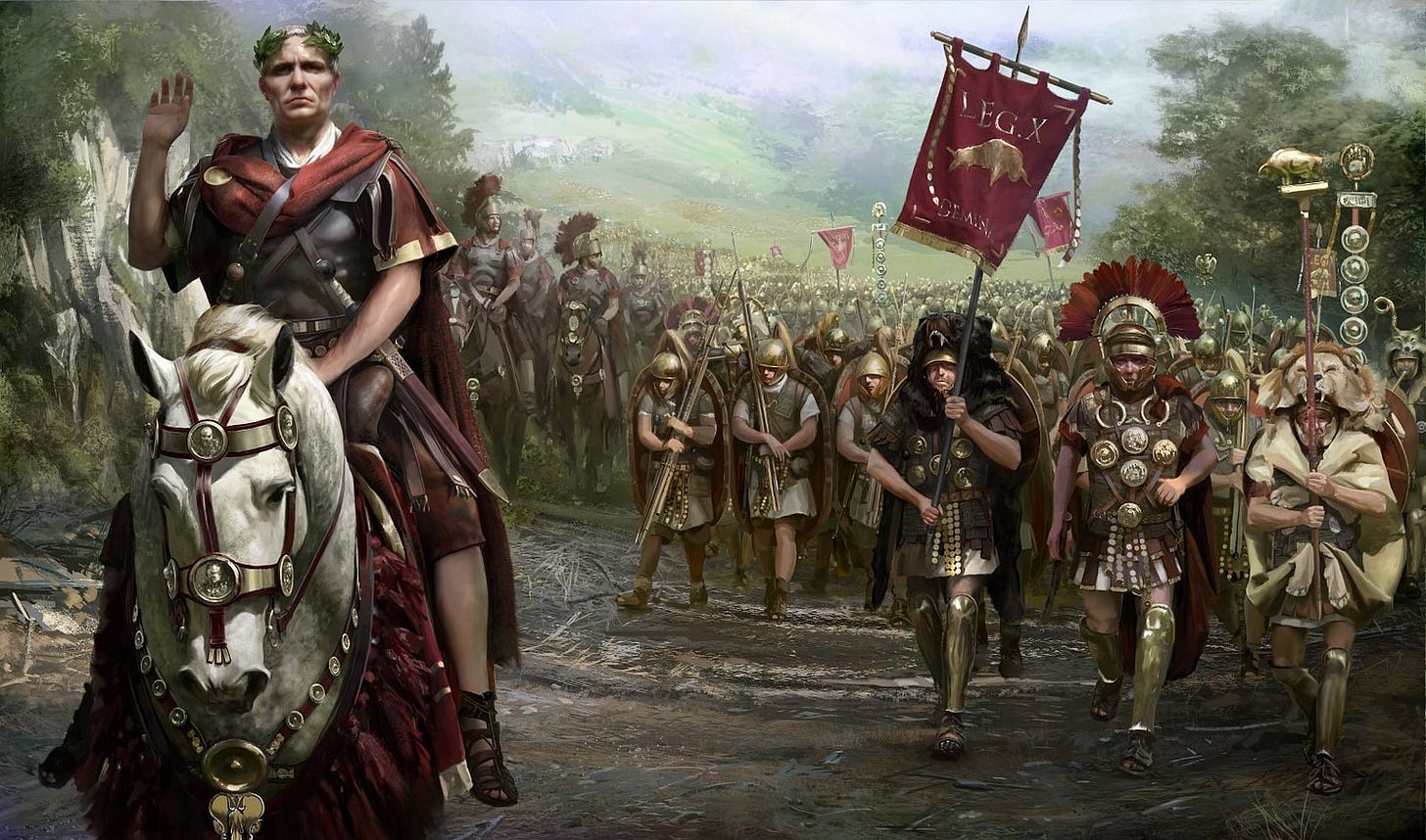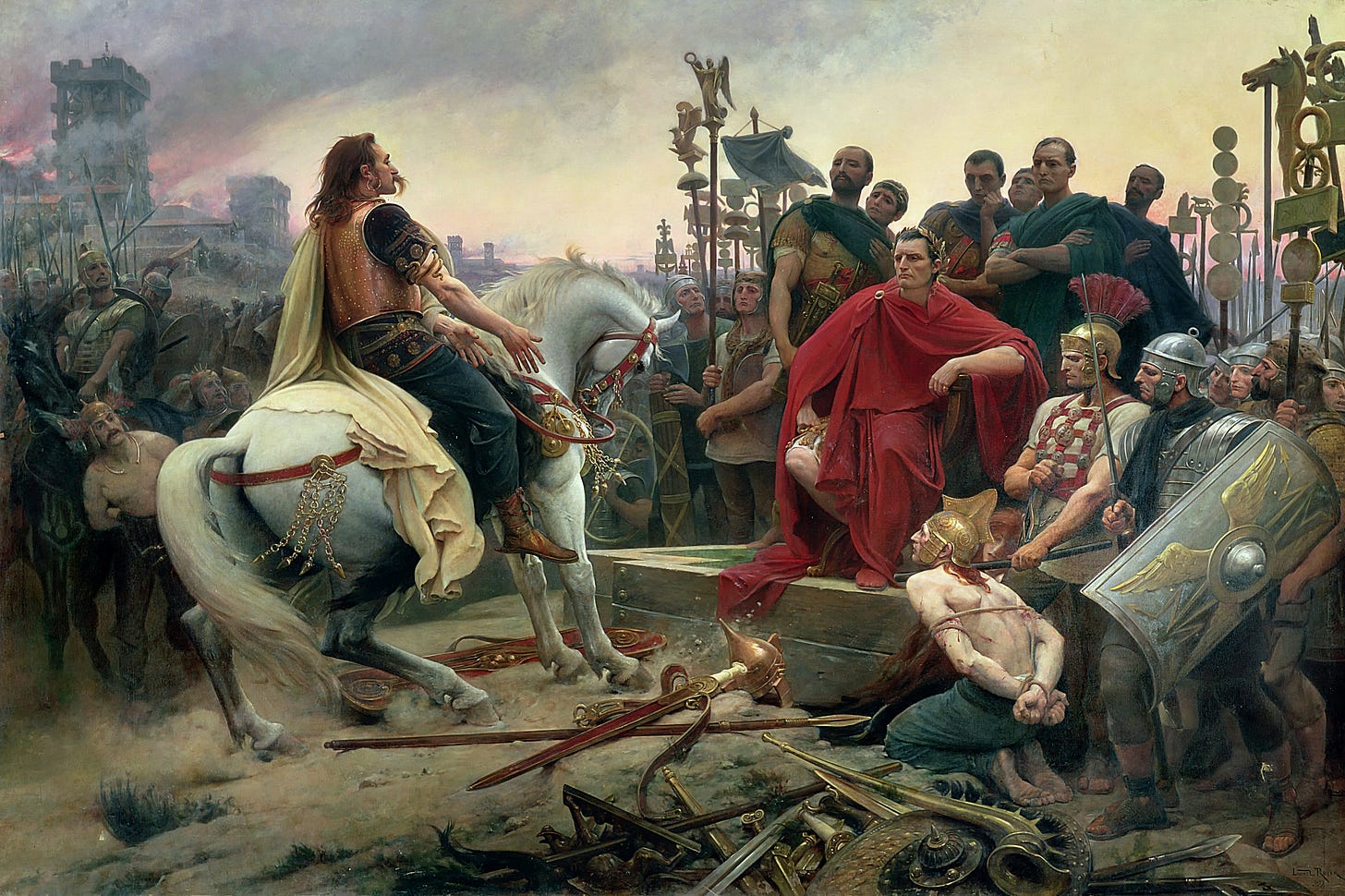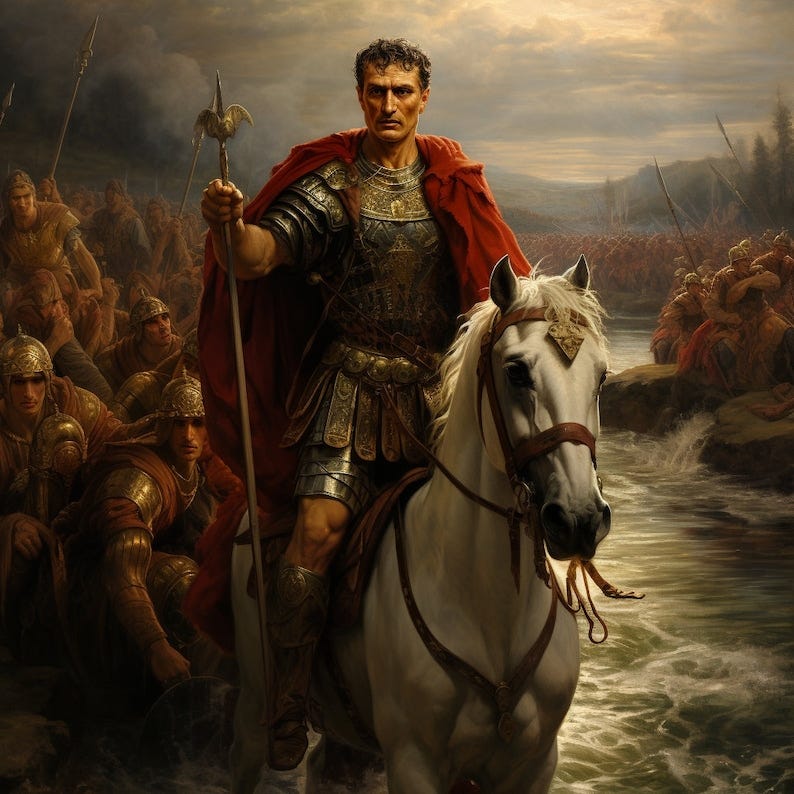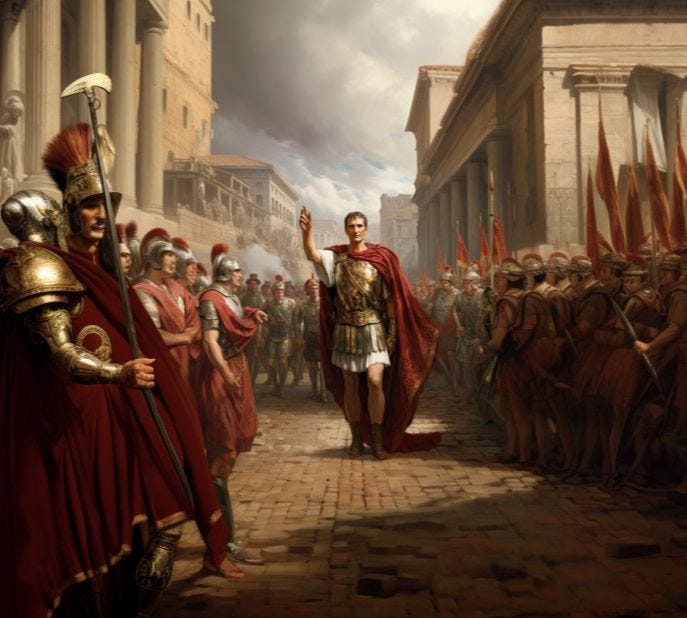Hello Dear Reader,
Today, we embark on a journey to explore the simply indomitable legacy of a towering figure of human history. To merely label him as influential in antiquity would be considerable an understatement. Gaius Julius Caesar was a titan, a triumphant conqueror, a formidable dictator, and an embodiment of power that stirred a spectrum of emotions in his friends and his enemies alike. His life transcends most figures of time, leaving an indelible mark on the tapestry of our shared human existence. So come, dear reader, take a seat around my fire and let’s begin. The Romans cross the Rubicon and there can be no turning back.
Veni, Vidi, Vici
In order to accurately describe the life of Julius Caesar, I must bring you some initial context regarding Rome, after all he was a Roman.
At the time of Caesar’s rise to power, Rome was a republic as it had been since 509 B.C. To properly begin, I need to set something straight. To call Ancient Rome a “democracy” would be slightly misleading but not inaccurate as many people believe the terms republic and democracy to be interchangeable (and they do share similarities) but, to be clear, they are not the same. I say this because, in the West, the term “democracy” gets thrown around a lot. Rome was not a liberal democracy in the modern Western sense of the word, where people have a more direct say in whom they elect. The Romans maintained a Republic with some democratic elements in a number of ways. The first was that they were not ruled over by a single person as it had an assembly and a senate but the lower classes did not find itself having much power in choosing their representation as many of the rulers were pre-chosen by the many powerful families that held sway over the governing bodies. Those that did not come from powerful families but were common folk were called plebeians. To say that had no power would also be misleading as they could hold sway in small local matters.
Overall in the Roman Republic’s Government there were three main governing bodies: The Comitia Centuriata played a crucial role in deciding matters of war, passing laws, and electing magistrates. It also had the power to consider appeals for capital convictions and manage foreign relations. Another body, the Concilium Plebis, focused on electing officials and issuing decrees for the plebeian class. Over time, it gained authority to make decrees binding for the entire Roman community. Lastly, the Comitia Tributa, open to free, adult males, elected minor officials, approved local legislative decisions, and held some judicial powers, limited to levying fines rather than administering punishment.
To help summarize the previous paragraphs, the Roman Republic was indeed ruled according to its written laws and governing bodies with the lower class having little say in whom they could elect. We compare this to a Western democracy or a liberal democracy where leaders are largely elected by majority rule, with lower classes having a much higher degree of participation (should they choose to vote).
So It Begins
Our man, Gaius Julius Caesar, was born in July of 100 B.C. to the Julian family, an old patrician lineage with proud claims to descent from the goddess Venus. To provide further context, the Julii, the gens (clan) to which Caesar belonged, were among Rome's original and oldest aristocratic families. However, to say the family was rich or powerful would be incorrect as they were not. So, Julius Caesar decided to change that.
In one of his earliest political moves, he decided to marry a woman named Cornelia in 84 B.C. Why was this a political move? Well Cornelia was the daughter of Lucius Cornelius Cinna, a successful political leader of Marian revolutionaries, and it put Caesar in the spotlight. However, Lucius Cornelius Sulla, the man who had the Marian revolutionaries raised against him did not like the marriage because it put Caesar in league with the radicals. Now, Sulla then led a counter-revolution (a successful once, I might add) and wanted Caesar to divorce her. Caesar did not divorce Cornelia and because of this, lost all his property as well as almost his life. Being put off by his rather terrifying opposition, he chose the best place to “hide” and decided to join the ranks of the Roman military. He ended up serving in Asia Minor or present day Turkey. After Sulla had died in 78 B.C., he returned to Rome and resumed his political career, attacking the counter-revolutionaries that Sulla once led.
In 75 B.C., during a journey to the Greek city of Rhodes, to study under professor of oratory, Molon, Caesar faced a dramatic turn of events when he was captured by pirates. Undeterred by his captivity, Caesar maintained an air of authority, even joking with the pirates about his eventual plans to capture and crucify them. This seemingly audacious demeanor concealed the challenges of his confinement. Eventually, a ransom was raised, securing his release. However, true to his word, once freed, Caesar swiftly gathered a fleet, pursued the pirates, and had them captured and crucified. His enemies would find that he would always be a man of his word.
His political career took off when, in 69 B.C. he was elected quaestor, the lowest rung of Roman political office. Then, a few short years later, in 63 B.C., he was elected pontifex maximus, the highest religious office in Rome. He had risen through the ranks rather quickly and began to surround himself with those who can prove themselves valuable. One of those people would be Marcus Licinius Crassus. Patron, benefactor, and friend, Marcus Crassus would practically sponsor Caesar’s rise in all but name. He would finance Caesar’s campaign for pontifex maximus as well as using his sway to help Caesar gain command of military campaigns. He then continued his political momentum by being elected praetor in 62 B.C., a judicial position.
Up to this point, Caesar had known power. He had held sway over a number of positions throughout the Roman government for a number of years. However, that was about to change. He was about to taste real power when in 59 B.C., Caesar formed the First Triumvirate with Pompey and Crassus. This informal political alliance aimed to consolidate power and counterbalance the influence of the Senate. Caesar's election as consul in the same year marked a significant step in his political ascent. However, tensions within the triumvirate and the death of Crassus in 53 B.C. (he died on a military campaign fighting the Parthian Empire) strained the fragile alliance.
He Would Not Lose
With his political career established, we must go back for a moment and discuss his military career. In 58 B.C., he embarked on one of the most consequential chapters of his life—the Gallic Wars. Appointed proconsul of Gaul, Caesar demonstrated his military brilliance in a series of campaigns that ultimately brought the vast territory under Roman control.
The Gallic Wars, spanning from 58 B.C. to 50 B.C., saw Caesar facing formidable opponents, including the skilled Gallic chieftain Vercingetorix. Yet, in the end, Caesar's strategic genius and the discipline of his legions prevailed. The conquest of Gaul not only showcased his military prowess but also provided him with significant wealth and a fiercely loyal army.
However, his absence from Rome stirred political tensions. The Senate, as well as Pompey, had grown wary of his growing influence, and called for his return to the capital, leading to the famous dilemma known as the Rubicon Crossing in 49 B.C. Caesar, facing the choice between obeying the Senate's command and risking prosecution or defying it and risking civil war, famously declared, "Alea iacta est" ("The die is cast") as he crossed the Rubicon River with his army. See, dear reader, Roman generals were supposed to leave their armies on the other side of the Rubicon River to avoid Rome feeling threatened. The Roman ascent (or descent) into an Empire would be complete with Caesar’s advancement onto Rome.
This bold move marked the beginning of the Roman Civil War, a conflict between Caesar and his former ally Pompey. The ensuing battles, including the Battle of Pharsalus in 48 B.C., culminated in Caesar's victory. Pompey fled to Egypt, where he was assassinated, solidifying Caesar's dominance and ending the war.
As Caesar returned to Rome, his power reached unprecedented heights. In 46 B.C., he celebrated a fourfold triumph, symbolizing his victories in Gaul, Egypt, Pontus, and Africa. Caesar's influence over Rome continued to grow, leading to a series of political and social reforms that aimed to address longstanding issues within the Republic.
However, his ascent to a de facto dictatorship in 44 B.C. and his perceived monarchic ambitions unsettled many senators and aristocrats. I would ask you to remember earlier in the publication where we discussed the influence powerful families have over Roman affairs. The Senate, alarmed by Caesar's increasing power, viewed him as a threat to the traditional Roman Republic. Little did they know that the Republic was dead already. Long Live the Republic.
Et Tu, Brute?
We finally come to the tragic conclusion of the life of Julius Caesar. The Senate, with whom he had been feuding all his life, decided that they could take no more transgressions (or lose anymore of their power).
So, on what would be called the Ides of March in 44 B.C., a sinister conspiracy unfolded within the hallowed walls of the Roman Senate, forever altering the course of history. Gaius Julius Caesar, a figure who never faced defeat, faced a perilous fate. The conspirators, a group of disgruntled senators led by figures like Brutus, believed that Caesar's growing power posed an existential threat to the Roman Republic. To give them credit, they would be right. The Senate and the Republic would never quite see the power that they once had after Caesar’s reign.
As Caesar took his seat in the Senate, he was ambushed by the conspirators, each bearing a grievance and a hidden dagger. The air was thick with tension as the first blow struck, followed by others, until the once-mighty Caesar lay lifeless on the Senate floor. The famous phrase "Et tu, Brute?" (“and you, Brutus?”) attributed to Caesar captured the profound betrayal he felt, realizing even his trusted ally Brutus had turned against him. The assassination of Julius Caesar marked the culmination of political tensions long n the making, paving the way for a tumultuous period in Roman history and the rise of his adopted son, Octavian, who would become Augustus and formally establish the Roman Empire. Of course, Octavian would only become Emperor in 27 B.C. after a period of intense and brutal civil wars but to cover those wars after Caesar’s death would be long enough for another publication.
The Die Has Been Cast
Now, dear reader, we come to the end of our journey but before we depart from each other, let us talk about how the world has been changed by him.
First and foremost, the lands that Caesar has conquered would be vastly more progressive than the lands he did not. Reading, writing, arithmetic, engineering, trade, were all contributions the Romans made to their areas (at least to varying degrees). Not let me be clear, they did not treat the conquered as well as their fellow Romans but Zurich, Strasbourg, Worms, London, Barcelona etc., were all areas that were built by Romans and flourished. Now, these were not all Caesar’s direct contributions as most of these cities were founded when Rome was an Empire and there would be no Empire without Julius Caesar and his example.
One may make the argument that without him, Western Europe would not have been as advanced as it is today as the Romans helped Western Europe to get ahead of the rest of the world. They gave them the tools to thrive.
Well dear reader, it seems that although Caesar lies dead, Rome enters into a new age. I had a wonderful time together and would like you to know that you are welcome around my fire anytime. Join me next time where we take a trip to the Far East, where a separate ancient civilization is flourishing.

